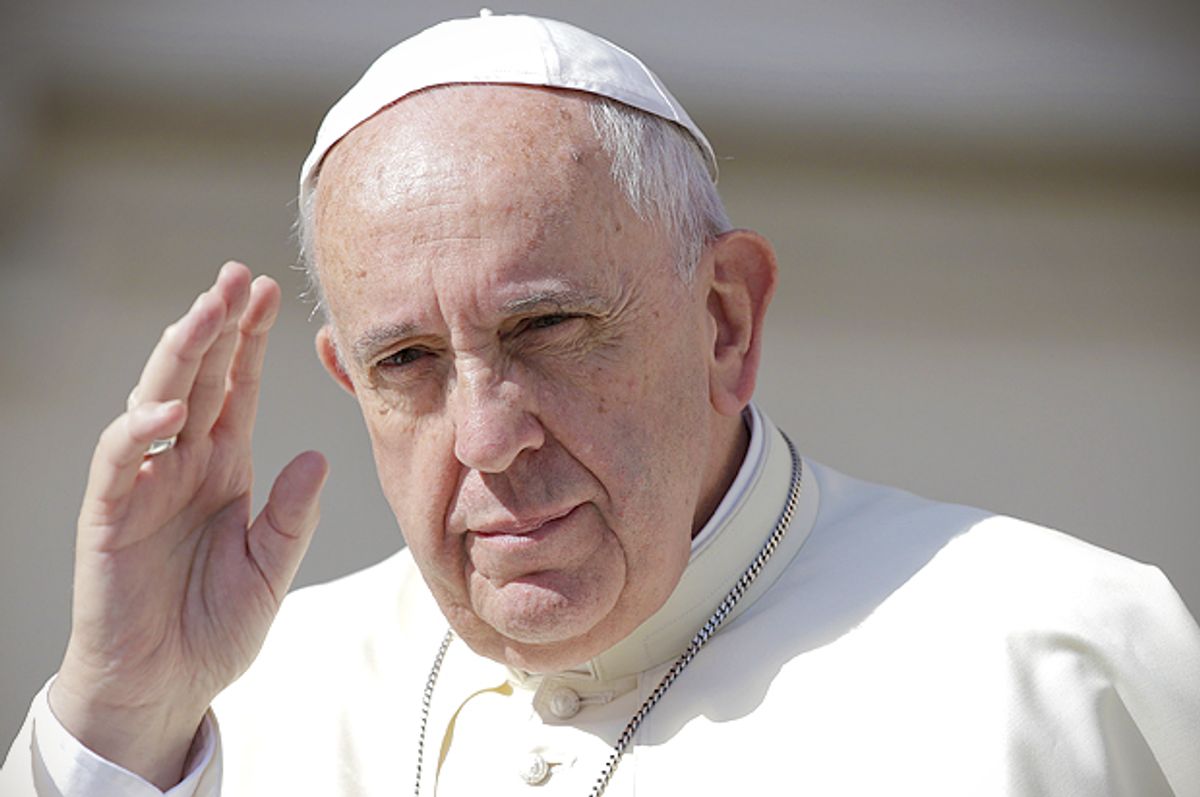Yes, he's still resolute on the issue of "traditional marriage." Yes, he's still firmly against women becoming ordained priests. But as popes go, Francis is still pretty badass — running into Burger Kings, dropping the mic on climate change, flustering his fellow Catholic Rick Santorum to an enjoyable degree. And he is consistently hardcore when it comes to the toxicity of greed and the damage it is doing to humanity. Imagine that — a spiritual leader who actually has his priorities in the right place.
Speaking this week in a mass in Bolivia during his tour of South America, the Argentina native decried our "throwaway" culture, one in which people are too easily "discarded." As the pontiff put it, consumerism "is a mentality in which everything has a price, everything can be bought, everything is negotiable. This way of thinking has room only for a select few, while it discards all those who are unproductive." And he spoke of the value of all, "no matter how little they possess or seem capable of contributing." So take that, 1 percent.
It's a common theme in the 78 year-old Jesuit's rhetoric. Even before he became pope, he's spoken strongly on subject. Back in 2002 he delivered a blistering sermon on "the sad spectacle of those who no longer know how to lie and contradict themselves to hold onto their privileges, their rapaciousness, and their ill-earned wealth." In 2009 he railed against those in his native country who "opt for exacerbating inequalities even more" and "unjust economic structures that give rise to great inequalities." And since ascending to the papacy, he's really been hammering it. Speaking to a crowd in St. Peter's Square in 2013, he lambasted "the poison of emptiness that insinuates itself into our society based on profit and having [things], that deludes young people with consumerism." And last year, he called the pursuit of affluence a "spiritual cancer" and warned, "We see signs of an idolatry of wealth, power and pleasure, which come at a high cost to human lives."
I'm not saying I don't have my issues with the guy on certain topics. I do. But what I love is that he consistently doesn't just blab some useless feelgood "Be nice to those poors" message. It's great and important to work toward closing wage gaps and lifting people out of economic distress, but there's more to be done than that. Francis understand that, and calls out the evil of valuing human beings based on what they have and how much money they make. He speaks to a culture that regularly attempts to shame people for having less. Tries to literally hide them from view. He understands that the evil of wealth disparity isn't simply about a few having so much, and many having so little. It's about the psychological burden that such a system places our sense of compassion and self-worth. In the US, where where a spectacularly wealthy man can assert that "people need to work longer hours," we cavalierly pretend we live in a meritocracy and that poverty is a sign of personal failure. It's sad and it's sick. It's an assault on basic dignity. And on the list of things I'm glad for is a powerful world leader stepping up and challenging that, regularly. Because despite the constant barrage of messages we all receive to the contrary, your net worth is not your worth.

Shares